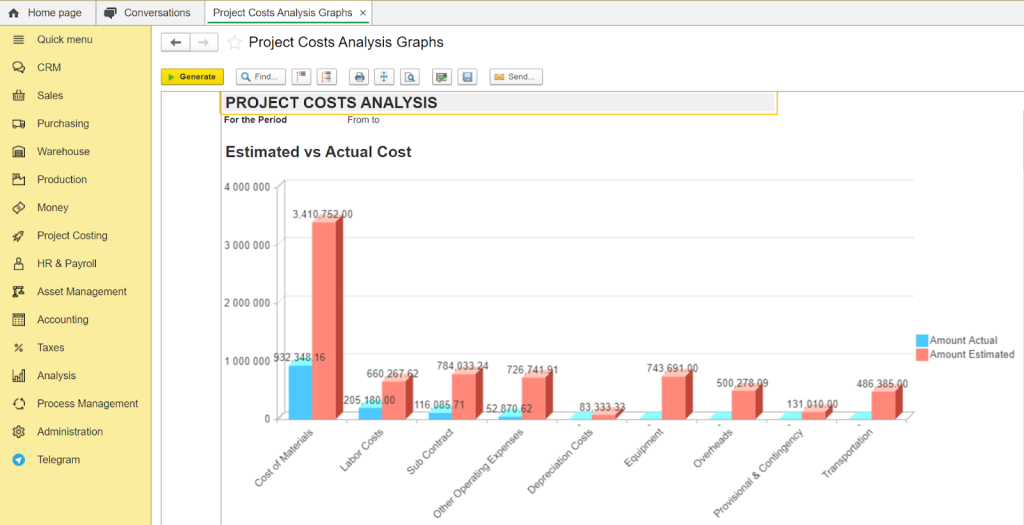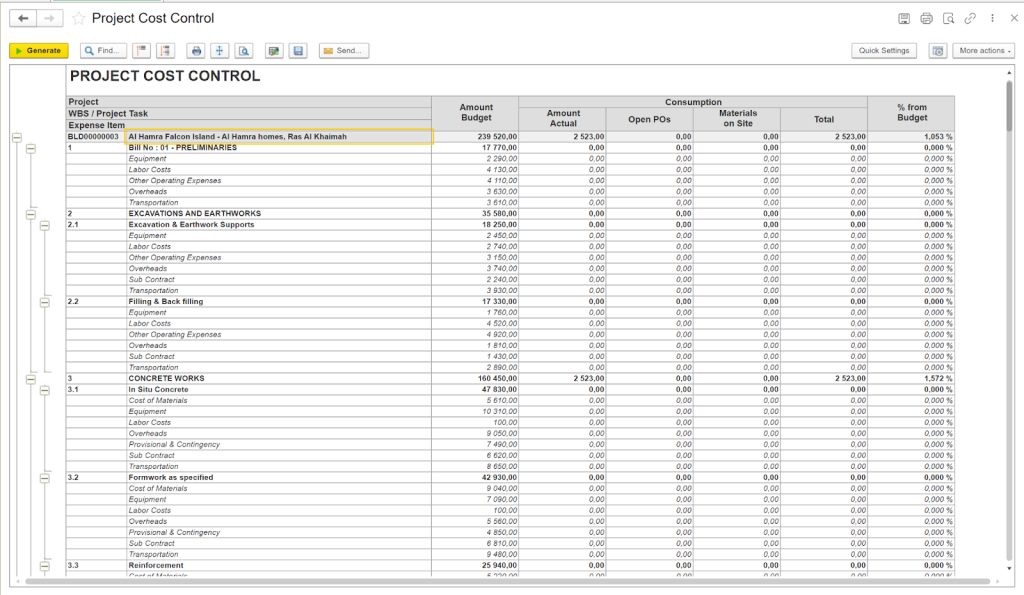Every project starts with a construction budget. Budget planning is a time-consuming process that requires careful attention and the use of the right tools for accurate calculations and more efficient reporting.
Insufficient time devoted to budgeting can negatively impact your construction project. In this article, we delve into the theoretical aspects of budgeting in construction and provide a guide with stages that can help you clarify your budgeting process for construction in the UAE.
What is Construction Budgeting?
Construction budgeting is the process of estimating and planning costs for a project. This includes all costs that the project will incur from the initial design phase to the completion of the project. Typically, a construction budget includes the following expenses:
-
Labor. Salaries of workers hired for the project.
-
Operational. Expense of operating on a daily basis (i.e., utility bills, equipment maintenance and site supervision costs).
-
Material. Raw construction materials costs (i.e. bricks, concrete, lumber, etc.).
-
Equipment and machinery. Expenses for purchasing or leasing construction equipment.
-
Permits and fees. The fees required by the government and any other third-party (i.g, building permits in Dubai).
-
Design and architectural fees. Expenses for paying architects and designers who plan and create the drawings and specifications for the construction project.
-
Site preparation. Cost for preparation the site for a construction project (i.g., demolition).
-
Subcontractor. Salary for subcontractors.
-
Contingency. Money saved for unexpected events like bad weather or a rise in material.
-
Overhead. Pay for things like office expenses and administrative costs for the company.
The budget serves as a financial plan that helps ensure the project is completed within its financial constraints and provides a detailed breakdown of expected expenses.
For example, imagine you are planning to build a new house. The construction budget for this project would start with the cost of purchasing the land. Next, you would need to account for design fees paid to architects and engineers, as well as the cost of obtaining necessary permits from local authorities.
The budgeting would also include the cost of materials like bricks, cement, wood, and roofing. Additionally, you need to factor in labor costs for hiring builders, electricians, plumbers, and other workers. You might also need to rent or buy construction equipment such as scaffolding, drills, and concrete mixers.
Beyond these basic costs, the construction budget should also set aside a contingency fund to cover any unexpected expenses that might arise during construction, such as price increases for materials or additional work required by unforeseen problems. By carefully planning and documenting all these expenses, you can better manage the project's finances and avoid running out of money before the house is completed.
There are several software and construction budget templates that accountants use to create a construction budget. FirstBit’s Project Costing Software helps plan, estimate and manage the project finances. It is tailor-made to help construction companies realize their budget planning goals.
Why is Construction Budgeting Important?
The primary purpose of construction budgeting is to outline the required funding for a project, detailing projected costs and available funds over time. However, a construction budget also helps with the following things:
Relationships Between Contractors and Owners
The contractor and owner are pleased when construction is finished at or below budget. Contractors can demonstrate their success by completing the project within the construction budget, positively impacting their profits.
By doing so, they ensure that the owners are content about not having to exceed their expected expenses to finish the job. This strengthens customer relationships, enhancing the likelihood of receiving a referral or collaborating with an owner again.
Strategic Decision Making
A construction budget is a financial roadmap for a project, helping managers and stakeholders make informed decisions, prioritize spending, and stay within budget. Effective budgeting allows teams to plan resources efficiently, minimize risks, and ensure the project remains financially sustainable from start to finish.
For example, by knowing the specific costs of each component, you can avoid overspending on non-essential items and ensure that critical areas are adequately funded. It also provides data needed for strategic decision-making, allowing you to evaluate the financial implications of various options and choose the best one for the project's needs.
Potential Risks
Unforeseen obstacles are prevalent in the construction sector. Factors such as ground and weather conditions, unanticipated delays in permitting and zoning, and modifications to floorplans can result in your company incurring heavy additional costs.
A detailed construction budget helps identify potential financial risks early, helping managers develop mitigation strategies to address them before they escalate into major issues. For example, if your budget analysis reveals that material costs are volatile, you can decide to purchase materials in bulk when prices are low or set aside a contingency fund to cover potential cost increases.
Clear Documentation
One of the key reasons construction budgeting is vital for a company is because it provides clear documentation of all financial aspects of a project. This detailed record-keeping helps maintain transparency and accountability, allowing every expenditure and financial decision to be tracked and verified.
With clear documentation through a project budget, you can accurately track actual costs against budgeted amounts. This helps identify discrepancies and make necessary adjustments promptly. It also serves as a valuable reference for resolving disputes, ensuring compliance with regulations, and simplifying audits.
Moreover, well-documented budgets from past projects inform future planning, improving the accuracy of estimates and financial strategies.
Keep every project on budget
Track expenses in FirstBit ERP
Request a demo
Types of Costs in Construction
Construction costs are typically divided into direct and indirect. Further, they can be categorized as either fixed or variable.
Direct and Indirect Costs
Direct costs encompass all expenses directly associated with a specific construction project. These costs are only attributable to one specific construction project and go entirely towards its completion. For instance, construction workers' salaries, subcontractor charges, and the materials needed for construction are considered direct costs.
On the other hand, indirect costs encompass all expenses incurred by a construction company that cannot be directly attributed to a particular project. These general shared expenses support multiple projects simultaneously.
Administrative salaries, safety gear, and overhead costs like rent or utilities fall into this category. These costs will be incurred regardless of whether a project is active or not and, thus, have a more substantial impact on the company's overall profit margins. In many cases, including these within a detailed construction budget helps improve financial accuracy and ensures resources are allocated efficiently.
Fixed and Variable Costs
Fixed costs remain constant regardless of the scale of the construction project. For example, if you rent machinery like an excavator, the rental cost remains unchanged regardless of usage across different job sites.
Variable costs fluctuate based on the scope of the construction project. Expenses such as construction materials increase in proportion to the quantities ordered. Similarly, overtime labor expenses vary depending on project demand and scheduling requirements. A thorough construction project budgeting process ensures that both fixed and variable costs are carefully planned and monitored.
Contingency Funds
A construction contingency is an amount of money set aside to cover unexpected costs due to risks, events, or changes that could affect the project’s cost over time. This extra money is not for any specific part of the work. It’s like an insurance policy against surprise expenses.
Deciding how much money to set aside for contingencies is essential. It would be best to have enough to deal with uncertainties and keep the construction on track. Most projects set aside around 3-10% of the total budget for contingencies.
Steps to Create a Construction Budget
Here are steps you can take to double-check your construction budget planning strategy:
1. Research and Analysis
Review historical data from similar projects, find some references, consult suppliers, and thoroughly understand the new project’s specifics to forecast a construction project’s cost accurately. Here, you need to set realistic expectations by considering available resources, design options, and other relevant factors.
By analyzing the data you find, you will easily begin to conquer the planning budget for your construction project. Then, move on to the next step.
2. Development
Refine your initial draft budget by making incremental adjustments and moving to the active budgeting phase. Engage with suppliers and subcontractors to validate timelines, obtain updated pricing for custom requests, and seek secondary quotations. Finalize floor plans and design selections and begin recruiting and scheduling construction personnel.
These efforts should yield a polished construction estimate ready for client approval.
3. Pre-Construction Documentation
Meet with all stakeholders (contractors, architects, engineers) to discuss the project, review the budget, identify any issues, and create mitigation strategies.
It is essential to document every step you take during the life of your construction project. These steps include storing documentation, permits, all contracts, and deliverables. This phase is critical to reducing risks, such as cost overruns, from the start of the project and ensuring the budget and timeline remain on track.
Construction
Regularly revisit and reassess your construction budget throughout the construction process, ideally conducting a detailed review before issuing invoices for payment installments.
Checking the budget carefully helps build trust with clients and keeps things clear by often sharing updates on the building work and money matters. This constant checking also helps in managing the money well, allowing for the support of more than one project at the same time.
Prevent cost overruns
Request a demo
Best Practices for Creating Accurate Construction Budgets
Implementing budgeting best practices won't do all the work for you, but it will guide you in effectively managing your finances.
-
Start your construction budgeting as early as possible. While you may make many changes within a week, having a starting point provides a foundation and adds confidence to your decisions.
-
Leverage experience from similar projects. Doesn’t matter if they are ones you have completed or ones you have detailed information about. The budgeting strategies from these projects can serve as a foundational skeleton for your own budget.
-
Establish a reliable contingency fund for your construction budget. This fund provides a financial safety net, ensuring unexpected costs don't catch you off guard. Planning for unforeseen expenses, you can keep construction projects on track with their financial targets, enhancing overall project management and outcomes.
-
Utilize digital tools for construction budgeting. You can use dedicated planning systems or comprehensive ERP solutions. Integrating these tools into your budgeting process enables you to manage finances with greater accuracy and proactivity, allowing for swift responses to project scope changes or market condition shifts.
-
Make regular oversight and WIP accounting. This will help you identify expense discrepancies, enabling timely budget adjustments. WIP and frequent budget reviews ensure alignment with actual spending and project progress, preventing cost overruns and ensuring the project stays within budget for successful completion.
How FirstBit Helps with Construction Budgets
As mentioned previously, the right chosen software can completely change your budget planning attitude.
First Bit ERP features will increase efficiency in project management and budget planning. Our solution offers smooth reporting and analysis tools that allow construction teams to generate comprehensive budget reports, track key performance indicators, and gain insights for continuous improvement at once.
Here, you can track your budget expenses, comparing actual and estimated amounts. By doing this, you can introduce flexibility into the process by allocating more funds or, conversely, reducing it.
In our ERP software, you will be able to optimize your planning by using the price comparison option.
First Bit ERP system also enables proactive cost control measures by setting up alerts for budget deviations, enforcing spending limits, and facilitating approval workflows for budget adjustments.
Protect your profit margins
Use FirstBit to compare planned vs. actual costs
Request a demo
FAQ
1. What is a construction budget?
2. Why is budgeting important in construction?
3. What are the main types of costs in a construction budget?
4. What are the key steps in creating a construction budget?

Anna Fischer
Construction Content Writer

See FirstBit ERP solutions in action
Discover how our system solves the unique challenges of contractors in a personalized demo.
After the demo you will get a quotation for your company.
After the demo you will get a quotation for your company.














